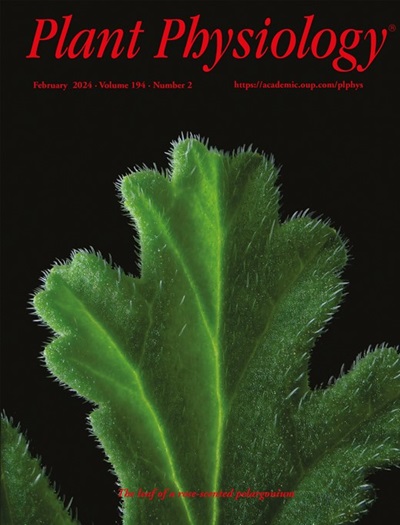MPK4 phosphorylates MYC2 transcription factors to regulate jasmonic acid signaling and herbivory responses in maize
IF 6.5
1区 生物学
Q1 PLANT SCIENCES
引用次数: 0
Abstract
Regulation of responses induced by herbivory and jasmonic acid (JA) remains poorly understood in the important staple crop maize (Zea mays). MYC2 is the key transcription factor regulating many aspects of JA signaling, while mitogen-activated protein kinases (MAPKs or MPKs) play important roles in various plant physiological processes. Using a combination of reverse genetics, transcriptome analysis, and biochemical assays, we elucidated the important role of MPK4 in maize resistance to insects and in JA signaling. Silencing MPK4 increased the JA and jasmonoyl-isoleucine levels elicited by wounding or simulated herbivory but decreased maize resistance to armyworm (Mythimna separata) larvae. We showed that MPK4 is required for transcriptional regulation of many genes responsive to methyl jasmonate, indicating the important role of maize MPK4 in JA signaling. Biochemical analyses indicated that MPK4 directly phosphorylates MYC2s at Thr115 of MYC2a and Thr112 of MYC2b. Compared with nonphosphorylated MYC2s, phosphorylated MYC2s were more prone to degradation and exhibited enhanced transactivation activity against the promoters of several benzoxazinoid biosynthesis genes, which are important for maize defense against insects. This study reveals the essential role of maize MPK4 in JA signaling and provides insights into the functions of MAPKs in maize.MPK4 磷酸化 MYC2 转录因子,调控玉米的茉莉酸信号传导和草食性反应
在重要的主粮作物玉米(Zea mays)中,人们对食草动物和茉莉酸(JA)诱导的反应的调控仍然知之甚少。MYC2 是调控 JA 信号多方面的关键转录因子,而丝裂原活化蛋白激酶(MAPK 或 MPK)在植物的各种生理过程中发挥着重要作用。我们综合利用反向遗传学、转录组分析和生化测定,阐明了 MPK4 在玉米抗虫性和 JA 信号转导中的重要作用。沉默 MPK4 会增加由伤害或模拟草食性引起的 JA 和茉莉酰异亮氨酸水平,但会降低玉米对军蝽(Mythimna separata)幼虫的抗性。我们的研究表明,许多对茉莉酸甲酯有反应的基因的转录调控都需要 MPK4,这表明玉米 MPK4 在 JA 信号转导中发挥着重要作用。生化分析表明,MPK4 在 MYC2a 的 Thr115 和 MYC2b 的 Thr112 处直接磷酸化 MYC2。与未磷酸化的 MYC2s 相比,磷酸化的 MYC2s 更容易降解,并对多个苯并恶嗪类生物合成基因的启动子表现出更强的转录激活活性,而这些基因对玉米防虫具有重要作用。这项研究揭示了玉米 MPK4 在 JA 信号转导中的重要作用,并为了解玉米中 MAPK 的功能提供了启示。
本文章由计算机程序翻译,如有差异,请以英文原文为准。
求助全文
约1分钟内获得全文
求助全文
来源期刊

Plant Physiology
生物-植物科学
CiteScore
12.20
自引率
5.40%
发文量
535
审稿时长
2.3 months
期刊介绍:
Plant Physiology® is a distinguished and highly respected journal with a rich history dating back to its establishment in 1926. It stands as a leading international publication in the field of plant biology, covering a comprehensive range of topics from the molecular and structural aspects of plant life to systems biology and ecophysiology. Recognized as the most highly cited journal in plant sciences, Plant Physiology® is a testament to its commitment to excellence and the dissemination of groundbreaking research.
As the official publication of the American Society of Plant Biologists, Plant Physiology® upholds rigorous peer-review standards, ensuring that the scientific community receives the highest quality research. The journal releases 12 issues annually, providing a steady stream of new findings and insights to its readership.
 求助内容:
求助内容: 应助结果提醒方式:
应助结果提醒方式:


